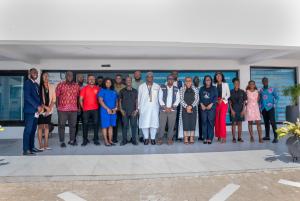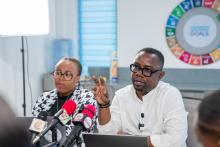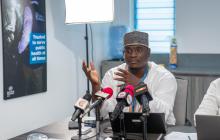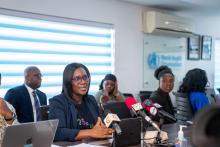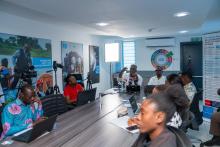Media Empowered to Tell Ghana’s Quality of Care Story
The media holds immense power to shape public opinion and influence how people understand health issues. More than just storytellers, journalists play a crucial role in driving accountability and shaping national health priorities. When done right, their work transforms numbers and reports into meaningful public conversations that can improve health outcomes for all.
As Ghana prepared to launch its first Quality of Care (QoC) Report, the World Health Organization (WHO) Ghana Country Office, in collaboration with the Ghana Health Service (GHS), organized a one-day media training to deepen journalists’ understanding of the report and its broader health implications.
The training brought together journalists, communication professionals, and media practitioners from various outlets to build their capacity to interpret health data accurately and craft compelling stories that connect evidence to impact. This will help ensure that once the QoC Report is released, its findings are communicated clearly to the public and used to advance Ghana’s health system and Universal Health Coverage (UHC) agenda.
Speaking at the opening session, Mr. Dominic Atweam, Strategic Health Information Officer at WHO Ghana, highlighted that the Quality of Care (QoC) Report provides important insights into how health services are delivered across the country, insights that demand attention and action. He stressed that the media plays a vital role in translating these findings into public conversations that drive accountability and policy response.
“Data on its own does not tell a story until it is interpreted correctly. This training ensures journalists understand not just the numbers, but the human stories behind them. Our goal is to see reporting that is evidence-based, accurate, and helps policymakers and citizens make informed decisions”, he said.
Participants were taken through sessions on interpreting and using data effectively, common pitfalls in reporting survey findings, and developing story angles that resonate with diverse audiences. Practical exercises also guided them on drafting headlines and leads, as well as dissemination strategies for reaching wider audiences through both traditional and digital platforms.
For many participants, the training was timely and insightful. Elizabeth, a reporter from a major media outlet, shared her experience:
“Before this training, I sometimes struggled to simplify health statistics for my audience. Today’s sessions have given me clarity on how to turn data into compelling, relatable stories that people can understand and act on”, she said.
Another participant, Dr Anagli, a medical doctor and advocate for digital health communication, appreciated the focus on accuracy and collaboration:
“It’s not just about reporting data, it’s about getting it right. I now understand how to avoid misinterpretations and how to work more closely with health experts to ensure factual reporting,” he said.
The training marked an important step in preparing the media for the release of Ghana’s first Quality of Care Survey Report, which will provide a detailed assessment of health service delivery across the country. With improved understanding of how to interpret and communicate these findings, journalists are expected to play a stronger role in driving public engagement and accountability in health care delivery.
As Ghana works towards achieving Universal Health Coverage, WHO and GHS continue to underscore the value of media partnership in ensuring that health information is both accurate and impactful.
For Additional Information or to Request Interviews, Please contact:
Abdul-Lahie Abdul-Rahim Naa
Communications Officer
WHO Ghana Country Office
Email: abdullahiea [at] who.int (abdullahiea[at]who[dot]int)
Tel: +233 20 196 2393



